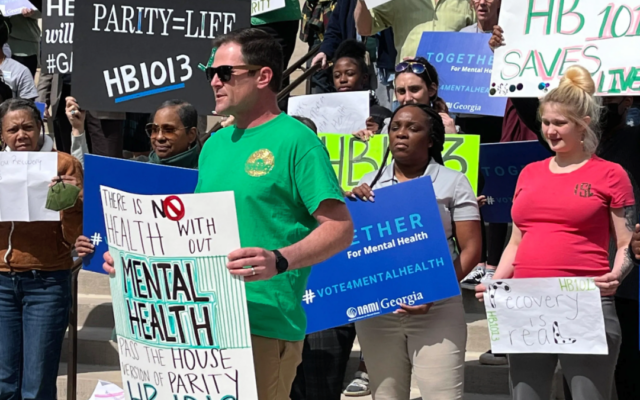Blank Family Foundation Gives $8M For Mental Health
Series of grants is aimed at boosting programs for young people nationally and locally.

The Blank Family Foundation has announced a series of grants totaling $8 million to boost mental health programs locally and nationally. Among the grants that were announced Dec. 14 were several that were specifically aimed at enhancing programs for young people.
There is a serious concern that 50 percent of all lifetime mental illness develops by the age of 14. Particularly alarming is the record number of people who took their lives last year. According to the Centers for Disease Control and Prevention, the most recent statistics, released in late November, showed that nearly 50,000 people committed suicide in the United States last year.
Young people particularly are experiencing a mental health crisis, especially if they are teenage girls. A survey in March by the CDC found around one in three high school girls in the U.S. have seriously considered attempting suicide and more than half of teen girls, 57 percent, reported feeling “persistently sad or hopeless.”
In announcing the grants, Arthur Blank, who co-founded The Home Depot, expressed his concern about the mental health of young people.

“It’s imperative that we support those who are in crisis and help where possible to aid in personal health and, in turn, impact community success. Our young people need our support now more than ever and I’m very proud that our family foundation is making a long-term commitment to invest in solutions.”
Among the grants that were made was a $1 million grant to the Greater Atlanta Georgia Youth Mental Health Funders Collaborative, which is comprised of a group of 40 donor organizations which was established six years ago to fund locally focused mental health initiatives. Last year, the Collaborative made a half dozen grants to both non-profits and Georgia state initiatives. They were intended to close what Bonnie Hardage of the organization sees as the immense gap between mental health needs and the state’s ability to provide care.
According to the most recent statistics, more than 10 percent of children aged 3 to 17 reported issues around anxiety and depression. Hardage pointed out that Georgia is third in the nation when it comes to the prevalence of mental health disorders and is 48th out of 50 states in spending on access to care.
“We don’t have enough mental health providers to address the current situation. And, therefore, pediatricians are becoming mental health providers. Counselors in schools are becoming mental health providers. Parents are becoming mental health providers because, for kids, you have to meet them where they are to ensure that they have a sense of well-being.”

Rebecca Brown, LCSW, of Jewish Family & Career Services, said that despite adding additional staff in the past several years there is still a wait list for appointments. And conditions have only worsened since the pandemic. Brown is also the BeWellATL Manager. BeWellATL, a newly launched initiative of JF&CS, is dedicated to promoting the well-being of Jewish young people, age 12-26, providing support and tools to respond to the growing mental health concerns, as well as resources for parents, caregivers, and Jewish professionals.
“There are plenty of statistics that say anxiety and other disorders among young people increased during COVID. And we’re still experiencing that. It’s changed the world for everyone. We launched the Horwitz-Zusman Child & Family Center back in August 2021 and hired more child and adolescent therapists so that we could meet the need.”
Therapists now make regular visits and/or provide education programs to at least four Jewish day schools in the city – at The Epstein School, Torah Day School, The Weber School, and the Atlanta Jewish Academy.
“We are trying to serve as many people as we can by being creative and working with our community partners like the day schools, to actually take the service directly to those who need them, and not force them to wait until we can see them.”
We are trying to serve as many people as we can by being creative and working with our community partners like the day schools, to actually take the service directly to those who need them, and not force them to wait until we can see them.
The Blank Foundation is only in its second year of making grants for mental health, Last year the foundation made grants totaling $5 million with the aim of adding a range of needs along with what the funder calls a “continuum of mental health, from crisis to stability to flourishing.” But the foundation’s Elizabeth Brown admits the foundation is making its way slowly and cautiously as it attempts to determine where its money can best be spent to make the most difference.
“What we’re seeing,” Brown commented, “is foundations like ours saying we have to have the combination of heart and generosity and learning and strategy to be an investor in the solutions for mental health. So, the conversation and philanthropy and the funding and philanthropy is really opening up.”
Blank’s interest in youth development work goes beyond just the field of mental health. His foundation has just announced the largest grant that the Atlanta-based Morris Brown College has received in the past 20 years. The historically Black institution has been given $3 million to expand its hotel training program for college students.
- News
- Local
- Bob Bahr
- Blank Family Foundation
- Centers for Disease Control and Prevention
- Mental Health
- Arthur Blank
- The Home Depot
- Greater Atlanta Georgia Youth Mental Health Funders Collaborative
- Bonnie Hardage
- Rebecca Brown
- Jewish Family & Career Services
- BeWellATL
- Horwitz Zusman Child & Family Center
- The Epstein School
- Torah Day School
- Weber School
- atlanta jewish academy



comments